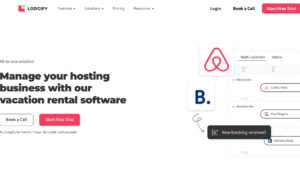For organisations in a variety of industries, booking software is essential for handling appointments, reservations, and scheduling. Whether you run a small business, provide services, or plan events, having the appropriate booking software can streamline your processes, improve client satisfaction, and increase productivity. This extensive guide will go through the major factors to take into account and the procedures to follow when selecting the best booking software for your individual requirements.
Introduction
Booking software has become an essential tool for facilitating easy scheduling and appointments as companies depend more and more on internet platforms to engage with their clients. Choosing the best booking software might be challenging due to the abundance of options on the market. This book strives to make the process simpler by offering insightful advice and helpful hints to aid in your decision-making.
Understanding Booking Software
The goal of booking software is to automate and streamline the booking process. It is sometimes referred to as appointment scheduling software or reservation management software. It enables companies to efficiently organise appointments, take reservations, and plan events. Features like calendar integration, online payments, notifications, and customer management tools are frequently included in booking software.
Using booking software has a variety of advantages. It does away with the need for manual scheduling, lowers administrative costs, decreases errors, and offers clients a handy self-service option. It also provides data insights and analytics to assist businesses in streamlining their operations and raising client satisfaction.
Types of Booking Software
When choosing the right booking software, it’s essential to consider the specific requirements of your business. Here are some common types of booking software:
- Software for online scheduling is perfect for service-based industries, like salons, spas, and healthcare providers. Customers can easily make appointments via a website or mobile app.
- Appointment booking software is designed for experts who need to schedule one-on-one appointments, such as consultants, therapists, and personal trainers. Customers can reserve particular time slots with particular suppliers using this software.
- Event management software: Designed for venues and event planners, this programme makes the entire event-planning process more efficient. It has functions including tickets, registration for attendees, venue management, Event app, and event promotion.
- Hotel reservation software facilitates room bookings, online bookings, availability tracking, and visitor management. It was created specifically for hotels and other lodgings.
Factors to Consider When Choosing Booking Software
Selecting the right booking software requires careful consideration of various factors. Here are key elements to evaluate:
- Scalability and Customization Options: Make sure the programme can expand with your company’s needs and adapt to those needs as they change. Look for options that let you customise the software to fit your identity and particular needs.
- Choose booking software with an easy-to-use user interface and clear navigation. Without additional training, it should be simple to use and navigate for both employees and customers.
- Integration with Existing Systems: Check to see if the booking software can easily interact with any existing systems you may have, such as a website, payment gateway, or CRM programme. By eliminating duplicate data entry, this integration improves operational effectiveness.
- Security and data privacy: It’s critical to safeguard private consumer data. Look for reservation software that uses strong security features, such as data backup, encryption, and adherence to applicable data protection laws.
- Consider your financial limitations as you assess the software’s pricing structure and payment options. Check to see if there are any flexible payment alternatives available, such pay-per-booking models or monthly subscriptions.
Evaluating Specific Needs and Requirements
To choose the right booking software, it’s important to evaluate your business’s specific needs and requirements. Consider the following factors:
- Finding Particular Business Needs Choose the fundamental features of the booking software that you need. Do you require it for making hotel reservations, managing events, or arranging appointments? To reduce your selections, be clear about the particular requirements.
- Identifying the Business’s Size and Scope: Take into account the scope and complexity of your business. Smaller companies may need simpler software, whilst larger companies may need more complex programmes that can handle large numbers of reservations and different locations.
- Aim to Meet Industry-Specific Requirements: Different sectors have different booking standards. Software that connects with electronic medical records, for instance, might be needed by healthcare providers, whereas functionality for managing group reservations and availability might be needed by tour operators.
Researching and Comparing Booking Software Options
Thorough research is crucial when choosing the right booking software. Follow these steps to evaluate and compare different options:

Fitness workout smartphone app, sport training plan at application, mobile screen, vector illustration. Exercise design at flat infographic interface concept. Phone technology for gym.
- Conduct online research by visiting the websites of several booking software companies. To learn more about their capabilities and track record, read about their features, functions, and client testimonials.
- Read Testimonials and Reviews from Customers: Look for unbiased customer testimonies and reviews. These observations can reveal important details on the functionality, user experience, and customer service of the software.
- Request demonstrations and trial periods. Several providers of booking software give these features. Take advantage of these chances to hands-on test the software. Examine its features, usability, and suitability for your business needs.
- Create a comparison chart to compare the features, price structures, and supplementary expenses related to each software solution.
Selecting the Right Booking Software
- Sort important features and functions by importance: Review your unique business requirements and rank the functions that are crucial to your operations. Take into account elements like calendar synchronisation, automated notifications, report examples, and appointment reminders.
- Examine Pricing Models: Compare the pricing models of the software solutions you’ve narrowed down, and decide which one best fits your budget. Don’t forget to take into account the software’s potential long-term worth and return on investment for your company.
- Consult the team or any interested parties: Participants in the team or other parties who can affect the decision should be included. To make sure that the software you choose satisfies the requirements of various departments or functions within your organisation, solicit their feedback and take into account their viewpoints.
- Make an Informed Decision: Choose the booking software that best meets your needs based on your research, feature prioritisation, budgetary considerations, and feedback from stakeholders. Before agreeing to a long-term contract, think about joining up for a free trial or a pilot project to better examine the software.
Implementing and Integrating Booking Software
- Once you have chosen the booking software, the next step is to implement and integrate it into your business processes. Follow these guidelines for a smooth transition:
- Establish a process for implementation: Make a thorough implementation plan that outlines the procedures, timetable, and roles involved in integrating the reservation software. Take into account any modifications or configurations needed to match the software with your company’s requirements.
- Staff and user training: Your staff and users should receive thorough training on how to utilise the booking software. To guarantee that everyone is familiar with the features of the software, provide practical training sessions, user manuals, or instructional videos.
- Make sure the system is compatible with current ones: To ensure seamless integration with your current systems, such as websites, payment gateways, or customer relationship management (CRM) platforms, work closely with your IT department or software provider. To prevent any hiccups, thoroughly test the integration.
- Test and Troubleshoot: Perform thorough testing before fully deploying the booking software to find and fix any potential problems or flaws. To ensure optimal performance, test various scenarios, simulate client reservations, and solicit input from staff and users.
Optimizing Booking Software Usage
To maximize the benefits of your chosen booking software, consider the following strategies:
- Customise the Software to Meet Specific Needs: Use the software’s customization features to modify it to meet the needs of your particular business. To fit your branding and customer experience objectives, customise booking forms, notification templates, and other features.
- Utilise Automation and Scheduling Features: Examine the booking software’s automation features. Create automated follow-up emails, appointments, or reminders to save time and improve client satisfaction. To maximise employee utilisation and reduce scheduling conflicts, use the scheduling functions.
- Track Performance and Collect Information: Track the booking software’s performance on a regular basis. Keep track of important statistics like booking and cancellation rates as well as client comments. Make data-driven decisions to streamline your booking procedures after analysing the data to find areas that could use improvement.
- Actively seek customer feedback on how they felt about their booking experience to make improvements. Utilise surveys, evaluations, or direct methods of communication to learn about their problems and suggestions for solutions. Include this feedback in the continuing software optimisation work you’re doing.
Conclusion
Businesses wishing to streamline their appointment scheduling, reservation management, or event organisation operations must make the proper booking software selection. You can choose a software solution that complies with your objectives and fosters the expansion of your organisation by being aware of your unique requirements, conducting in-depth research, and taking important variables into account.



































